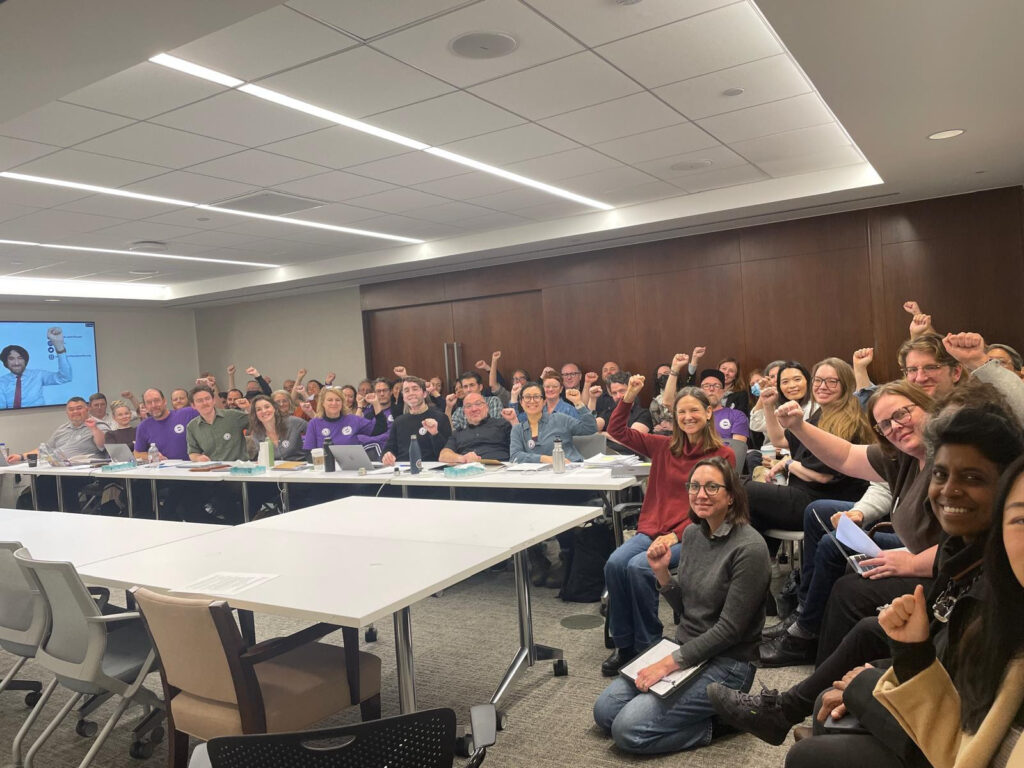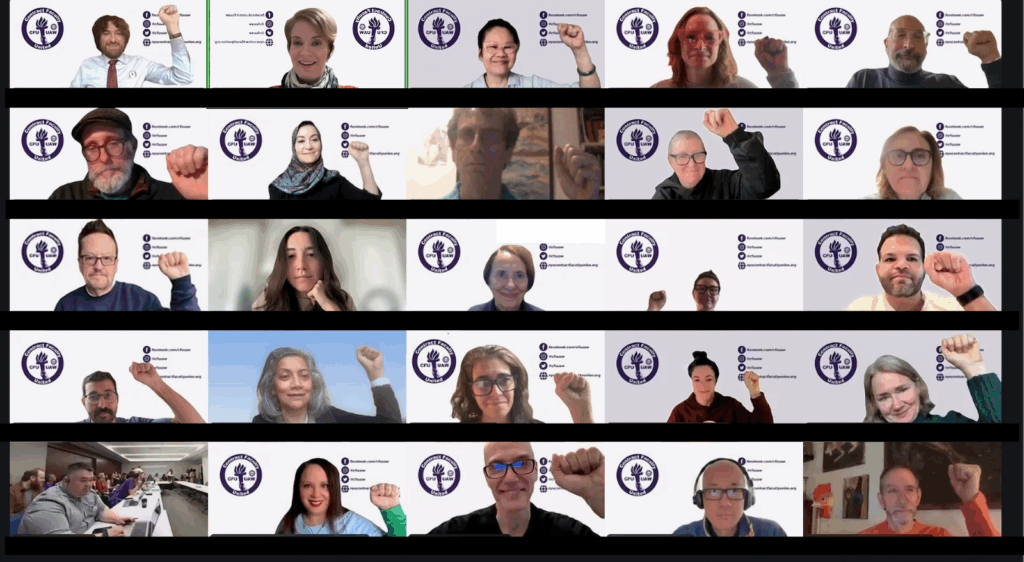$2000.That’s the extent of the raise the NYU administration thinks 75% of us deserve.
At our first bargaining session on November 1, 2024, we told the administration that a strong majority of contract faculty had voted to demand a compensation package that would respond to the high cost of living in NYC, correct salary compression, and address the large salary gap between men and women that exists in almost every school.
After a year of contract negotiations, we were deeply disappointed to receive yet another compensation proposal that merely tinkers around the edges. They made some movement towards us, offering contractually-guaranteed 2.5% annual increases instead of the uncertainty and caprice of the AMI. But as we all know, a 2.5% increase does not keep pace with the cost of living in NYC, and neither will it solve the problem of stagnant and inverted salaries — nor will a one-time $2,000 bump. Their proposal does nothing address compression, nothing to make us whole from years of being underpaid, nothing serious to fix pay discrimination, and is nowhere near parity with our tenure-track peers.
But it wasn’t all bad news.
Last Halloween, we gathered in Schwartz Plaza with a couple hundred allies, including Zohran Mamdani and other elected officials, to celebrate the start of our negotiations. A year later, we brought an equally big crowd into bargaining, with more than 50 people in the room and another 75 on Zoom. Together, we showed the administration’s representatives that we’re serious and united in demanding a fair and strong first contract — and we saw firsthand the power that comes from packing the room.


RSVP to observe bargaining November 14
The presence of so many colleagues made a difference in forcing the administration to take a few steps toward a fairer university. See for yourself on the Bargaining Tracker, which shows every proposal and counterproposal that either side makes.
Making good progress
The administration made substantial progress toward us on a Technology Committee, where they agreed that a joint faculty-administration committee will make advisory recommendations about technological change. They also came closer to guaranteeing adequate offices, classrooms, and technology so we can do our jobs. In both cases, we were able to offer responses in the room, and we’re close to agreement.
We also made considerable progress on Discipline and Dismissal and a closely-related article on the Administrative Positions that faculty sometimes take up alongside our professorial jobs. And we think we’re close to an agreement on Titles.
Small steps but still a lot of distance
In other areas, we continue to make slow progress. For the first time, contract faculty who are not currently eligible for sabbaticals will be able to apply for a semester of professional development leave after six years of service. But the administration’s proposal is still deeply inadequate. It limits the number of such leaves to ten people each year. Equally troubling, it fails to adequately protect current sabbatical policies in Tisch, Gallatin, and Tandon. We’ll keep fighting to secure existing benefits and ensure that all contract faculty have appropriate support for their scholarly and creative production.
In Grievance & Arbitration, they agreed to a fair process for grievances in which deans have conflict of interest. They’re also moving towards us on a Respectful Work Environment, including a new university-wide policy against bullying (note: this is a proposed update and not yet finalized) — but they continue to reserve the right to discriminate on gender transition status, caste, and political opinion. And, while they offered a fund of $150,000 a year to pay for visa and other immigration-related expenses for non-citizen colleagues, they continue to refuse to treat us like our tenure-track colleagues and promise to sponsor us for green cards.
Still insulting us
Unfortunately, the good news ends there.
The administration’s Workload proposal raises serious questions about their understanding of the way the university operates or how our jobs are structured. They continue to propose that we find tenured chaperones to serve as lead P.I.s on grant-funded projects. In their offer on Retirement, they are still denying us a phased retirement plan comparable to our tenured peers. Instead, they want us to be satisfied with a one-time buyout worth at best half of what tenured faculty get at retirement. On most other benefits, including health insurance, long term disability, transit, 403(b) contributions, and tuition remission, they insist that we can’t ask for more than tenure-track faculty get, while reserving the right to change our benefits at any time, however they like. And they continue to refuse to negotiate at all over housing benefits.
They also made little or no substantive movement on core issues of how the university works: Academic Freedom, Rules, Regulations, and Policies, Shared Governance, and Management and Academic Rights. These are central issues not only for us but for our students — and indeed for the integrity of the entire university. NYU cannot claim to be a university if half the full-time faculty are boxed out of deciding who teaches, what gets taught, to whom it is taught, and how it gets taught.
Meanwhile, we gave the administration new counterproposals on Appointment and Reappointment, Promotion, and Evaluation. In all three, we are seeking to defend the academic integrity of the institution while responding to the administration’s concerns.
What’s next?
We can continue to make progress toward a fair contract, but we can’t do it alone. When everyone shows up, everybody wins. All of the progress we made on Friday is attributable to the overwhelming presence of observers and the threat of further action.
Our goal is for every contract faculty member to observe bargaining at least once. So far, more than half of you have come — from every school and almost every department. If you haven’t observed a session yet, the time to get involved is now.
RSVP to observe the next bargaining session on November 14.
And sign up here for an upcoming escalation training, where you’ll learn how we can all take the next steps together.
In solidarity,
CFU-UAW BARGAINING COMMITTEE
Richard Dorritie (Rory Meyers College of Nursing)
Elisabeth Fay (Expository Writing Program, Arts & Science)
Robin Harvey (Teaching and Learning, Steinhardt)
Thomas Hill (Center for Global Affairs, SPS)
Peter Li (General Engineering, Tandon)
Benedetta Piantella (Technology, Culture, and Society, Tandon)
Jacob Remes (Gallatin School of Individualized Study)
Chris Chan Roberson (Undergraduate Film & TV, Tisch)
Jamie Root (French Literature, Thought and Culture, Arts & Science)
Fanny Shum (Mathematics, Courant Institute)
Heidi White (Liberal Studies)
